ago和before的区别及用法有哪些
before与ago、when,while,as区别

一、before与ago的区别1.ago表示“从现在起的若干时间以前”,意思是“距今……以前”,需和过去时或过去进行时连用。
before泛指“从过去起的若干时间以前”,意思是“距过去某时……以前”“与其……(毋宁)”,常和完成时连用,尤其在间接引语中,如:I visited him three days ago, but he had gone to Shanghai a week before.我三天前去访问他,但他已与那时的一周前到上海去了。
His parents died ten years ago.他父母十年前都去世了。
He said that his parents had died ten years before.他说他父母亲十年前都去世了。
I have never been there before.我以前从来没有去过那里。
2.如果不具体表明多少时间以前,只用before不用ago,意为“从前、以前”。
before仍以副词的形式置于被修饰语后,常与完成时候过去时连用。
如:Have you seen this film before?He asked me whether I had been to the Great Wall before.3.表示在某一点时间或事件以前时,只用before不用ago,这种用法是将before当作介词或连词使用。
ago不具有这一功能。
如:They will come back before six o’clock.It is hoped that this will be finished before the year 1995.希望这件工作将在1995年以前完成。
另外,before在句中的含义较多。
不少句子中,before虽然引导的也是一个时间状语,但是译成汉语时却不必译为“在……以前”。
a.如果before引导的从句动作发生得晚或慢,可译成“……才”。
before/ago,since用法

before和ago都能表示在一段时间以前,但是二者的内涵和具体用法有明显的区别:1. before表示从过去或将来某一时间算起多少时间以前,由于与这一时间状语连用的行为先发生在过去或将来某一时刻之前,因此往往出现在过去完成时态或将来完成时态中。
例如:①I called him up last night,but his mother told me he had left for Wuhan two days before.②She said that she had married him five years before.2.如果不具体表明多少时间以前,before意为"从前;以前",表示从现在开始追溯到过去一段时间,或者主句的谓语动词表示的是经常、反复发生的行为,以副词的形式置于句末,可以用在现在完成时态中。
例如:①I have never been to Beijing before.②Have you ever seen a tiger before?③I often go over the lessons that I have learned a few days before.注意:before前的时间状语如果是特定的,含义不一样。
试比较:He said he had arrived here a day before. (一天前)He said he had arrived here the day before. (前一天)3. ago指的是从现在起到过去时间的某一点的一段时间。
这个时间状语常与一般过去时态或过去进行时态连用。
例如:①I graduated from the college twenty years ago.②I was asked what I was doing a month ago.4. 表示在某一时间点或事件以前时,只能用before,不用ago。
agobefore的区别例句

ago before的区别例句
ago before的区别在表达意思不同、词性不同、用法不同。
扩展资料
用法:
一、表达意思不同
1、ago:以前;以前的
2、before:在……之前,先于;在……面前;面对(法院、法庭或其他官方机关)并受审;(宁愿……)不愿;在……以前;到……为止;以免,不然;(宁可……而)不愿;以前,过去,已经
二、词性不同
1、ago:通常在句中用作副词、名词和形容词。
2、before:通常在句中用作介词、连词、副词。
三、用法不同
1、ago:ago表示“从现在起的'若干时间以前”,意思是“距今……以前”,需和过去时或过去进行时连用。
2、before:before泛指“从过去起的若干时间以前”,意思是“距过去某时……以前”“与其……(毋宁)”,常和完成时连用,尤其在间接引语中。
例句:I visited him three days ago,but his mother said he had gone to Beijing two days before.我三天前去拜访他,但是他的妈妈说他两天前就去北京了。
ago和before 差别 及练习
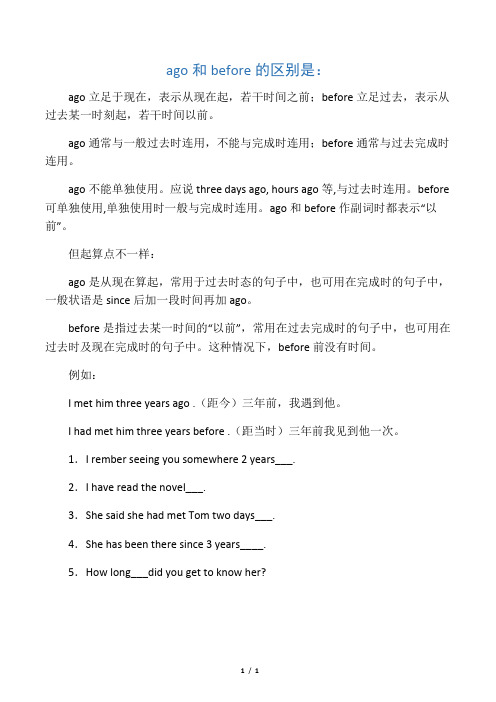
ago和before的区别是:
ago立足于现在,表示从现在起,若干时间之前;before立足过去,表示从过去某一时刻起,若干时间以前。
ago通常与一般过去时连用,不能与完成时连用;before通常与过去完成时连用。
ago不能单独使用。
应说three days ago, hours ago等,与过去时连用。
before 可单独使用,单独使用时一般与完成时连用。
ago和before作副词时都表示“以前”。
但起算点不一样:
ago是从现在算起,常用于过去时态的句子中,也可用在完成时的句子中,一般状语是since后加一段时间再加ago。
before是指过去某一时间的“以前”,常用在过去完成时的句子中,也可用在过去时及现在完成时的句子中。
这种情况下,before前没有时间。
例如:
I met him three years ago .(距今)三年前,我遇到他。
I had met him three years before .(距当时)三年前我见到他一次。
1.I rember seeing you somewhere 2 years___.
2.I have read the novel___.
3.She said she had met Tom two days___.
4.She has been there since 3 years____.
5.How long___did you get to know her?
1/ 1。
一般过去时时间标志词口诀
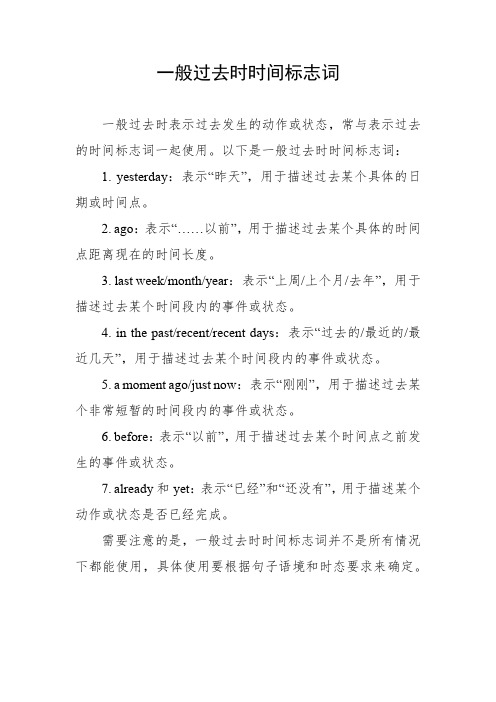
一般过去时时间标志词
一般过去时表示过去发生的动作或状态,常与表示过去的时间标志词一起使用。
以下是一般过去时时间标志词:
1. yesterday:表示“昨天”,用于描述过去某个具体的日期或时间点。
2. ago:表示“……以前”,用于描述过去某个具体的时间点距离现在的时间长度。
3. last week/month/year:表示“上周/上个月/去年”,用于描述过去某个时间段内的事件或状态。
4. in the past/recent/recent days:表示“过去的/最近的/最近几天”,用于描述过去某个时间段内的事件或状态。
5. a moment ago/just now:表示“刚刚”,用于描述过去某个非常短暂的时间段内的事件或状态。
6. before:表示“以前”,用于描述过去某个时间点之前发生的事件或状态。
7. already和yet:表示“已经”和“还没有”,用于描述某个动作或状态是否已经完成。
需要注意的是,一般过去时时间标志词并不是所有情况下都能使用,具体使用要根据句子语境和时态要求来确定。
in after later before ago earlier until 状语 区别

时间状语小结- 前前后后In【in + 时间段】介词,后接时间段,不能与时间点连用。
In用来表示从现在算起的“过一段时间以后”,常用在将来时的肯定句里,一般与go, come, start, arrive, return (be back), finish等表示瞬间动作动词连用,通常用于将来时或含有将来意义的句子。
They will arrive in half an hour. 半小时后他们将到达。
He will leave in a minute. 他一会儿就走。
After介词其后既可接时间点,又可接时间段。
【after+时间段】表示以过去时间为起点的一段时间以后,因此通常与过去时连用;He left there after two o'clock that afternoon.那天下午两点以后,他离开了那儿。
He started to go again after two days.两天以后,他又走了。
【after+时间点】如果用于一般将来时,那么其后应接时间点。
He'll come here after three o'clock.他3点钟后将来这儿。
He will arrive after five o’clock. 他5 点钟以后到。
【after+句子】连词,其后可接从句,连接2个句子。
I'll call you after I've spoken to them. 我和他们谈了以后就给你打电话。
After she had mixed flour with water, the children came home. 她用水和好面之后,孩子们回来了。
【after 单独使用】副词later in time; afterwards 表示以后And they all lived happily ever after . 从此以后他们都过着幸福的生活。
(完整版)ago和before区别

ago 和 before的区在哪里啊1.ago 表示“从在起的假设干从前〞,意思是“距今⋯⋯从前〞,需和去或去行用。
before泛指“从去起的假设干从前〞,意思是“距去某⋯⋯从前〞“与其⋯⋯〔毋宁〕〞,常和完成用,特别在接引中,如: I visited him three days ago, but he had gone to Shanghai a week before.我三天前去他,但他已与那的一周前到上海去了。
His parents died ten years ago.他父亲母亲十年前都去世了。
He said that his parents had died ten years before.他他父亲母亲十年前都去世了。
I have never been there before.我从前向来没有去那处。
2. 若是不详尽说明多少从前,只用 before 不用 ago,意“从前、从前〞。
before 仍以副的形式置于被修后,常与完成候去用。
如:Have you seen this film before?He asked me whether I had been to the Great Wall before.3. 表示在某一点或事件从前,只用before不用ago,种用法是将before看作介或使用。
ago 不拥有一功能。
如:They will come back before six o’clock.It is hoped that this will be finished before the year 1995.希望件工作将在1995 年从前完成。
别的,before 在句中的含多。
很多句子中, before 然引的也是一个状,但是成却不用“在⋯⋯从前〞。
a. 若是 before引的从句作生得晚或慢,可成“⋯⋯才〞。
是主句主或是名、代,或用it作形式主.He had almost knocked me down before he saw me.他几乎把我撞倒才看我。
初三英语中考语法详解(26)later 与 after,ago 与 before用法词义辨析

初三英语中考语法考点重难点详解(26)later 与after,ago 与before用法词义辨析因为词义相近,很多人分不清later 与 after,ago 与 before,要搞清楚他们的区别,关键得看用法。
1. later 与 after 最大的区别应该是:after 可以做连词,引导时间状语从句,而 later 只是个副词。
(1)时间段 + later:常用于过去,表示“稍后、......之后”A few minutes later, the the boss came in with my bag.几分钟之后,老板拿着我的包进来了。
later 也可以单独用,表示“从现在开始的以后”I will tell you later. 我以后会告诉你的。
表达一段时间之后表达一段时间之后,如果用在一般过去时,可以用:时间段+later,也可以用:after+时间段,例如:Two hours later, Jcak came back with an axe. 两小时之后,杰克拿着一把斧头回来了。
After two weeks later, they were both arrested. 两周之后,两个人都背逮捕了。
如果用在一般将来时,用in+时间段,例如:I will go to London in two weeks. 我两周之后去伦敦。
(2)after+时间点、时间段都可以, 多用于过去After 2 o'clock, they started to climb.两点过后,他们开始攀登。
After so many years in the US, he has changed a lot.在美国生活多年之后,他变了很多。
You mustn't come home after 10:30.你不准十点半之后才回家。
表示某时间点之后表示某时间点之后用:after+时间点after ten o'clock:十点之后after April 23rd:4月23号之后(3)after 可以引导从句,later 不能。
(完整版)in,after,later--ago与before的区别
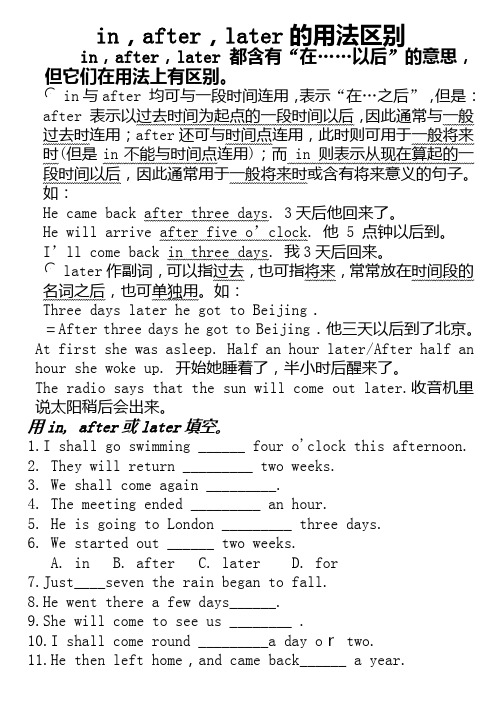
in,after,later的用法区别in,after,later 都含有“在……以后”的意思,但它们在用法上有区别。
in与after 均可与一段时间连用,表示“在…之后”,但是: after 表示以过去时间为起点的一段时间以后,因此通常与一般过去时连用;after还可与时间点连用,此时则可用于一般将来时(但是in不能与时间点连用);而 in 则表示从现在算起的一段时间以后,因此通常用于一般将来时或含有将来意义的句子。
如:He came back after three days. 3天后他回来了。
He will arrive after five o’clock. 他 5 点钟以后到。
I’ll come back in three days. 我3天后回来。
later作副词,可以指过去,也可指将来,常常放在时间段的名词之后,也可单独用。
如:Three days later he got to Beijing.=After three days he got to Beijing.他三天以后到了北京。
At first she was asleep. Half an hour later/After half an hour she woke up. 开始她睡着了,半小时后醒来了。
The radio says that the sun will come out later.收音机里说太阳稍后会出来。
用in, after或later填空。
1.I shall go swimming ______ four o'clock this afternoon.2. They will return _________ two weeks.3. We shall come again _________.4. The meeting ended _________ an hour.5. He is going to London _________ three days.6. We started out ______ two weeks.A. inB. afterC. laterD. for7.Just____seven the rain began to fall.8.He went there a few days______.9.She will come to see us ________ .10.I shall come round _________a day or two.11.He then left home,and came back______ a year.参考答案:1. after2. in3. later4. after5. in6.B7.afterterter 10.in 11.after“以前”解,但是用法是有区别的:1、ago放在表示时间段的词语后,意思是“从现在算起的若干时间以前”,谓语动词常使用一般过去时。
in,after,later--ago与before的区别
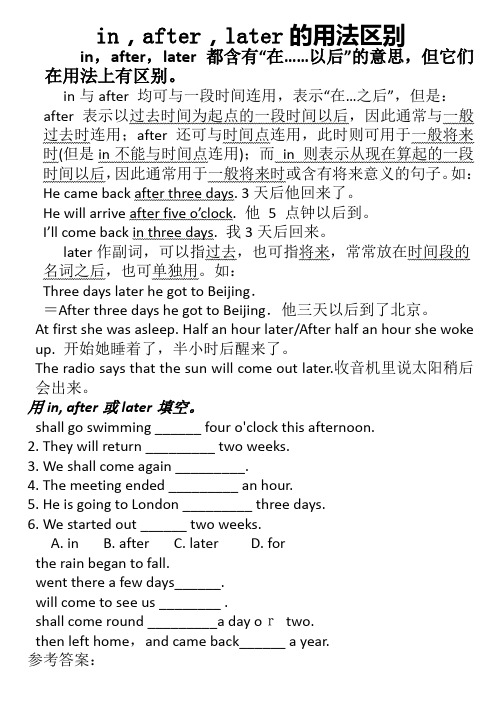
in,after,later的用法区别in,after,later 都含有“在……以后”的意思,但它们在用法上有区别。
in与after 均可与一段时间连用,表示“在…之后”,但是:after 表示以过去时间为起点的一段时间以后,因此通常与一般过去时连用;after还可与时间点连用,此时则可用于一般将来时(但是in不能与时间点连用);而in 则表示从现在算起的一段时间以后,因此通常用于一般将来时或含有将来意义的句子。
如:He came back after three days. 3天后他回来了。
He will arrive after five o’clock. 他5 点钟以后到。
I’ll come back in three days. 我3天后回来。
later作副词,可以指过去,也可指将来,常常放在时间段的名词之后,也可单独用。
如:Three days later he got to Beijing.=After three days he got to Beijing.他三天以后到了北京。
At first she was asleep. Half an hour later/After half an hour she woke up. 开始她睡着了,半小时后醒来了。
The radio says that the sun will come out later.收音机里说太阳稍后会出来。
用in, after或later填空。
shall go swimming ______ four o'clock this afternoon.2. They will return _________ two weeks.3. We shall come again _________.4. The meeting ended _________ an hour.5. He is going to London _________ three days.6. We started out ______ two weeks.A. inB. afterC. laterD. forthe rain began to fall.went there a few days______.will come to see us ________ .shall come round _________a day ortwo.then left home,and came back______ a year.参考答案:1. after2. in3. later4. after5. in“以前”解,但是用法是有区别的:1、ago放在表示时间段的词语后,意思是“从现在算起的若干时间以前”,谓语动词常使用一般过去时。
before 的用法
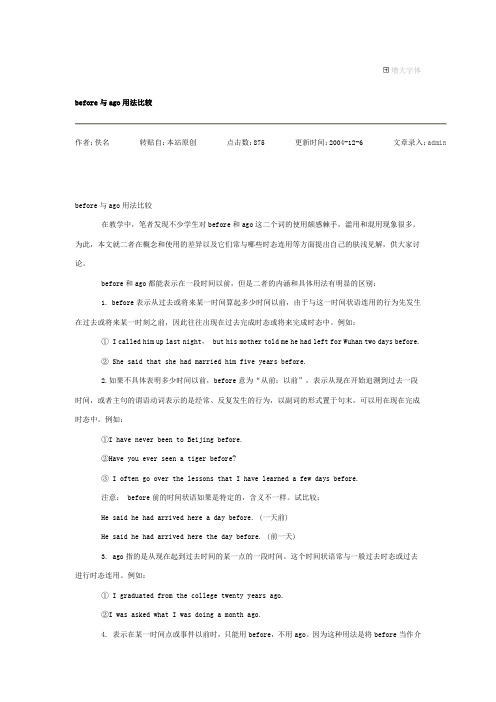
增大字体before与ago用法比较作者:佚名转贴自:本站原创点击数:875 更新时间:2004-12-6 文章录入:adminbefore与ago用法比较在教学中,笔者发现不少学生对before和ago这二个词的使用颇感棘手,滥用和混用现象很多。
为此,本文就二者在概念和使用的差异以及它们常与哪些时态连用等方面提出自己的肤浅见解,供大家讨论。
before和ago都能表示在一段时间以前,但是二者的内涵和具体用法有明显的区别:1. before表示从过去或将来某一时间算起多少时间以前,由于与这一时间状语连用的行为先发生在过去或将来某一时刻之前,因此往往出现在过去完成时态或将来完成时态中。
例如:① I called him up last night, but his mother told me he had left for Wuhan two days before.② She said that she had married him five years before.2.如果不具体表明多少时间以前,before意为“从前;以前”,表示从现在开始追溯到过去一段时间,或者主句的谓语动词表示的是经常、反复发生的行为,以副词的形式置于句末,可以用在现在完成时态中。
例如:①I have never been to Beijing before.②Have you ever seen a tiger before?③ I often go over the lessons that I have learned a few days before.注意: before前的时间状语如果是特定的,含义不一样。
试比较:He said he had arrived here a day before. (一天前)He said he had arrived here the day before. (前一天)3. ago指的是从现在起到过去时间的某一点的一段时间。
副词知识点详解(初中英语专项复习) (1)
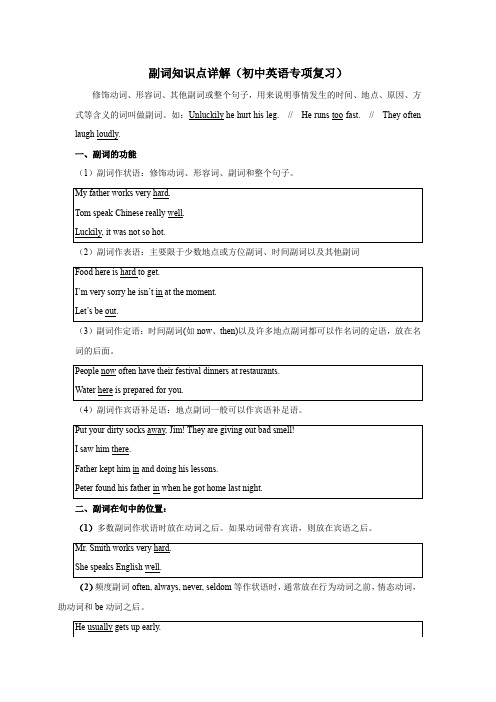
副词知识点详解(初中英语专项复习)修饰动词、形容词、其他副词或整个句子,用来说明事情发生的时间、地点、原因、方式等含义的词叫做副词。
如:Unluckily he hurt his leg. // He runs too fast. // They often laugh loudly.一、副词的功能(1)副词作状语:修饰动词、形容词、副词和整个句子。
(2)副词作表语:主要限于少数地点或方位副词、时间副词以及其他副词(3)副词作定语:时间副词(如now、then)以及许多地点副词都可以作名词的定语,放在名词的后面。
(4)副词作宾语补足语:地点副词一般可以作宾语补足语。
二、副词在句中的位置:(1)多数副词作状语时放在动词之后。
如果动词带有宾语,则放在宾语之后。
(2)频度副词often, always, never, seldom等作状语时,通常放在行为动词之前,情态动词,助动词和be动词之后。
(3)程度副词一般放在所修饰的形容词和副词的前面, 但enough作副词用时,通常放在被修饰词的后面。
(4)副词作定语时,一般放在被修饰的名词之后。
(5)地点副词和表示具体时间的副词一般放在句末。
如果这两个副词同时出现在一个句子中,则地点副词在前,时间副词在后。
三、副词的构成和分类1. 副词的构成:We should study hard at school.I can hardly see anything in the dark room.The question is very hard for me to answer.2. 副词的分类:He will be back tomorrow. 他明天将回来。
Yesterday we all went to the park. 昨天我们都去公园了。
The children are playing downstairs.Here people are practicing speaking English.Please go straight down the street.The birds are flying high.He runs very fast.The old man walked home slowly.Please listen to the teacher carefully.Her pronunciation is very good.I can hardly agree with you.Tom is old enough to go to school.How are you getting along with your studies?Where were you yesterday?Why did you do that?I often go out for a walk after supper.She is seldom out on Sundays.How I am going to kill the cat is still a question.That is why everyone is afraid of the tiger.He wondered how he could do it the next day. 他不知道第二天怎样做那事。
【英语知识点】ago和before的区别和用法
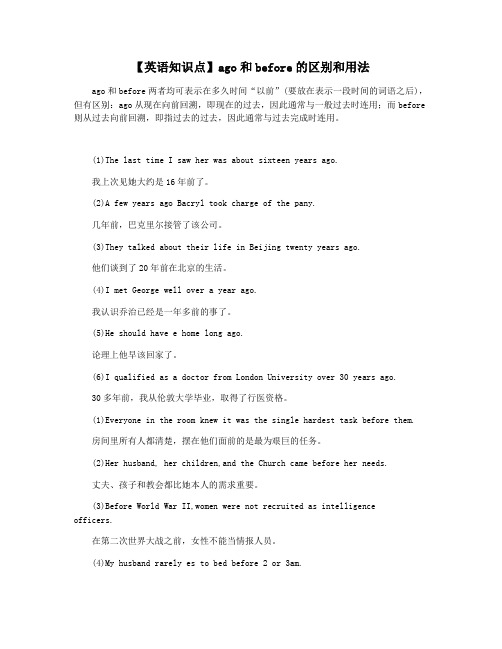
【英语知识点】ago和before的区别和用法ago和before两者均可表示在多久时间“以前”(要放在表示一段时间的词语之后),但有区别:ago从现在向前回溯,即现在的过去,因此通常与一般过去时连用;而before 则从过去向前回溯,即指过去的过去,因此通常与过去完成时连用。
(1)The last time I saw her was about sixteen years ago.我上次见她大约是16年前了。
(2)A few years ago Bacryl took charge of the pany.几年前,巴克里尔接管了该公司。
(3)They talked about their life in Beijing twenty years ago.他们谈到了20年前在北京的生活。
(4)I met George well over a year ago.我认识乔治已经是一年多前的事了。
(5)He should have e home long ago.论理上他早该回家了。
(6)I qualified as a doctor from London University over 30 years ago.30多年前,我从伦敦大学毕业,取得了行医资格。
(1)Everyone in the room knew it was the single hardest task before them.房间里所有人都清楚,摆在他们面前的是最为艰巨的任务。
(2)Her husband, her children,and the Church came before her needs.丈夫、孩子和教会都比她本人的需求重要。
(3)Before World War II,women were not recruited as intelligenceofficers.在第二次世界大战之前,女性不能当情报人员。
before与ago用法比较

before与ago用法比较before和ago 两者均可表示在多久时间“以前”(要放在表示一段时间的词语之后),但有区别:ago 从现在向前回溯,即现在的过去,因此通常与一般过去时连用;而before 则从过去向前回溯,即指过去的过去,因此通常与过去完成时连用(尤其用于宾语从句中)。
但是二者的内涵和具体用法有明显的区别:1. before表示从过去或将来某一时间算起多少时间以前,由于与这一时间状语连用的行为先发生在过去或将来某一时刻之前,因此往往出现在过去完成时态或将来完成时态中。
例如:① I called him up last night,but his mother told me he had left for Wuhan two days before.② She said that she had married him five years before.He said they had left five days before. 他说他们5 天前就离开了。
2.如果不具体表明多少时间以前,before意为“从前;以前”,表示从现在开始追溯到过去一段时间,或者主句的谓语动词表示的是经常、反复发生的行为,以副词的形式置于句末,可以用在现在完成时态中。
例如:①I have never been to Beijing before.②Have you ever seen a tiger before?③ I often go over the lessons that I have learned a few days before.注意:before前的时间状语如果是特定的,含义不一样。
试比较:He said he had arrived here a day before. (一天前)He said he had arrived here the day before. (前一天)注:在表示推测或为使语境生动的句子中,有时也可用 ago 代替before。
ago和before的区别

ago和before的区别在哪里啊1.ago表示“从现在起的若干时间以前”,意思是“距今……以前”,需和过去时或过去进行时连用。
before泛指“从过去起的若干时间以前”,意思是“距过去某时……以前”“与其……(毋宁)”,常和完成时连用,尤其在间接引语中,如:I visited him three days ago, but he had gone to Shanghai a week before.我三天前去访问他,但他已与那时的一周前到上海去了。
His parents died ten years ago.他父母十年前都去世了。
He said that his parents had died ten years before.他说他父母亲十年前都去世了。
I have never been there before.我以前从来没有去过那里。
2.如果不具体表明多少时间以前,只用before不用ago,意为“从前、以前”。
before仍以副词的形式置于被修饰语后,常与完成时候过去时连用。
如:Have you seen this film before?He asked me whether I had been to the Great Wall before.3.表示在某一点时间或事件以前时,只用before不用ago,这种用法是将before当作介词或连词使用。
ago不具有这一功能。
如:They will come back before six o’clock.It is hoped that this will be finished before the year 1995.希望这件工作将在1995年以前完成。
另外,before在句中的含义较多。
不少句子中,before虽然引导的也是一个时间状语,但是译成汉语时却不必译为“在……以前”。
a.如果before引导的从句动作发生得晚或慢,可译成“……才”。
- 1、下载文档前请自行甄别文档内容的完整性,平台不提供额外的编辑、内容补充、找答案等附加服务。
- 2、"仅部分预览"的文档,不可在线预览部分如存在完整性等问题,可反馈申请退款(可完整预览的文档不适用该条件!)。
- 3、如文档侵犯您的权益,请联系客服反馈,我们会尽快为您处理(人工客服工作时间:9:00-18:30)。
ago
只作副词,必须与一段时间连用,表示以现在为起点一段时间之前。
before既可以作副词也可以作连词。
作副词时,可以单独使用;也可以和一段时间的词连用,表示的是已过去某个时间为起点一段时间之前。
ago 和before的区别
1、意思不同
ago 表示“从现在起若干时间以前”。
before 表示“从过去某时起若干时间以前”。
2、词性不同
ago只能作副词。
例句:
She left England three days ago.
她三天前离开了英格兰。
before既可作副词又可作介词和连词。
例句:
Please close the window before you leave.
离开前请关好窗户。
(连词)
3、后接单词不同
ago常与动词一般过去式连用。
例句:
His grandfather died two years ago.
他的外公两年前去世了。
before常与过去完成式连用。
例句:
I had finished the work two days before.
两天前我就已经完成了工作。
ago的用法
1、用于一般过去时。
例句:
A short while ago, my sister helped me to carry one of my old bookcases up
the stairs.
片刻之前,我妹妹帮我把我的一个旧书柜抬上了楼。
2、所指的时间是从现在算起。
例句:
It was stolen twenty years ago when Ted was a boy of fifteen.
那辆自行车是在20年前当泰德还是个15岁的小伙子时被偷去的。
before的用法
1、用于过去完成时
例句:
A short time before, great trees had covered the countryside for miles
around.
在那时不久之前,高大的树木覆盖着方圆数英里的地方。
2、它所指的时间不是从现在算起,而是从过去某一时刻算起,有时可以与previously 换用
例句:
Last summer, I finally left the firm that I had joined eighteen years
before.
去年夏天,我终于离开了从那时算起18年前我所参加的那个商行。
